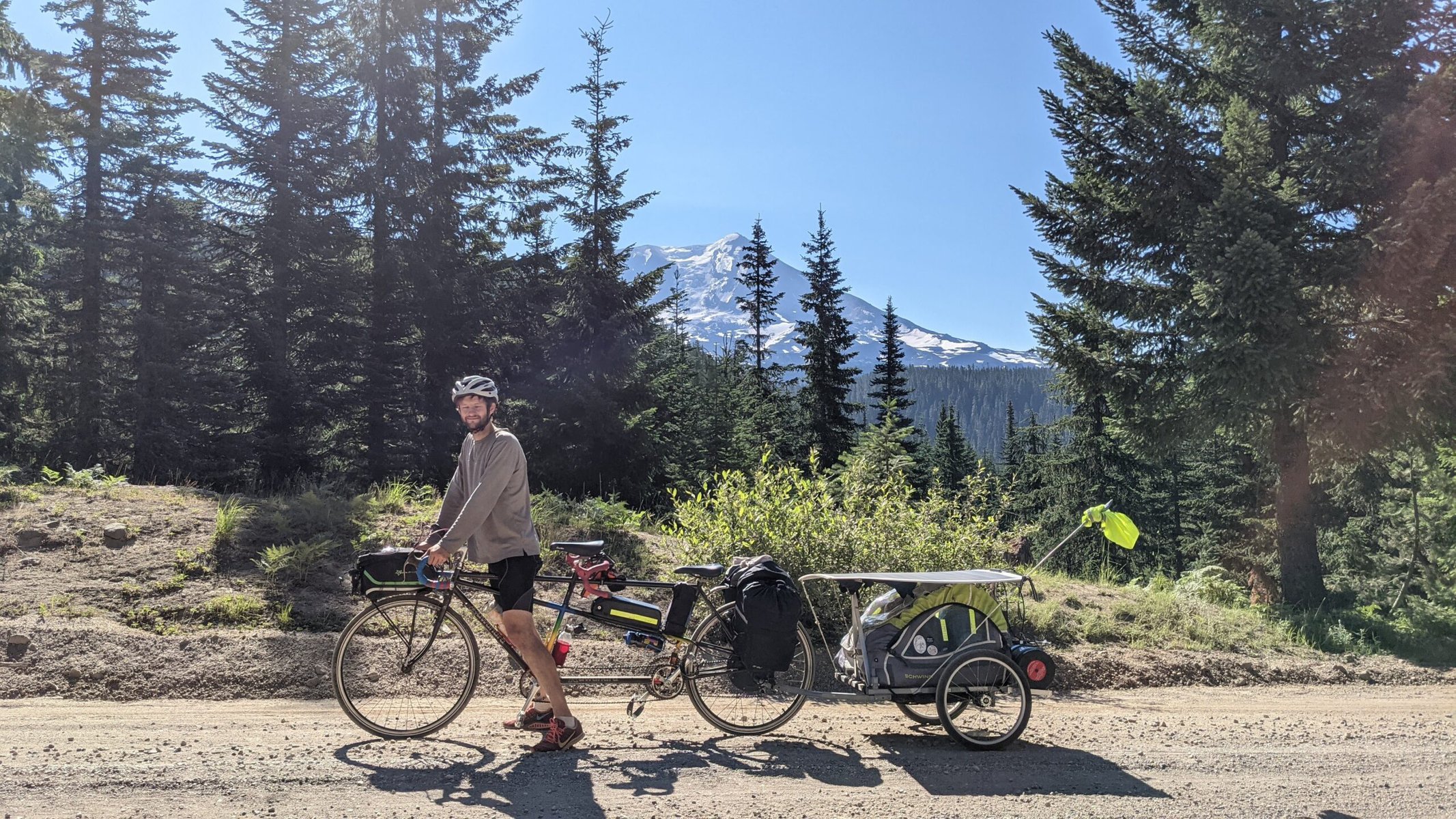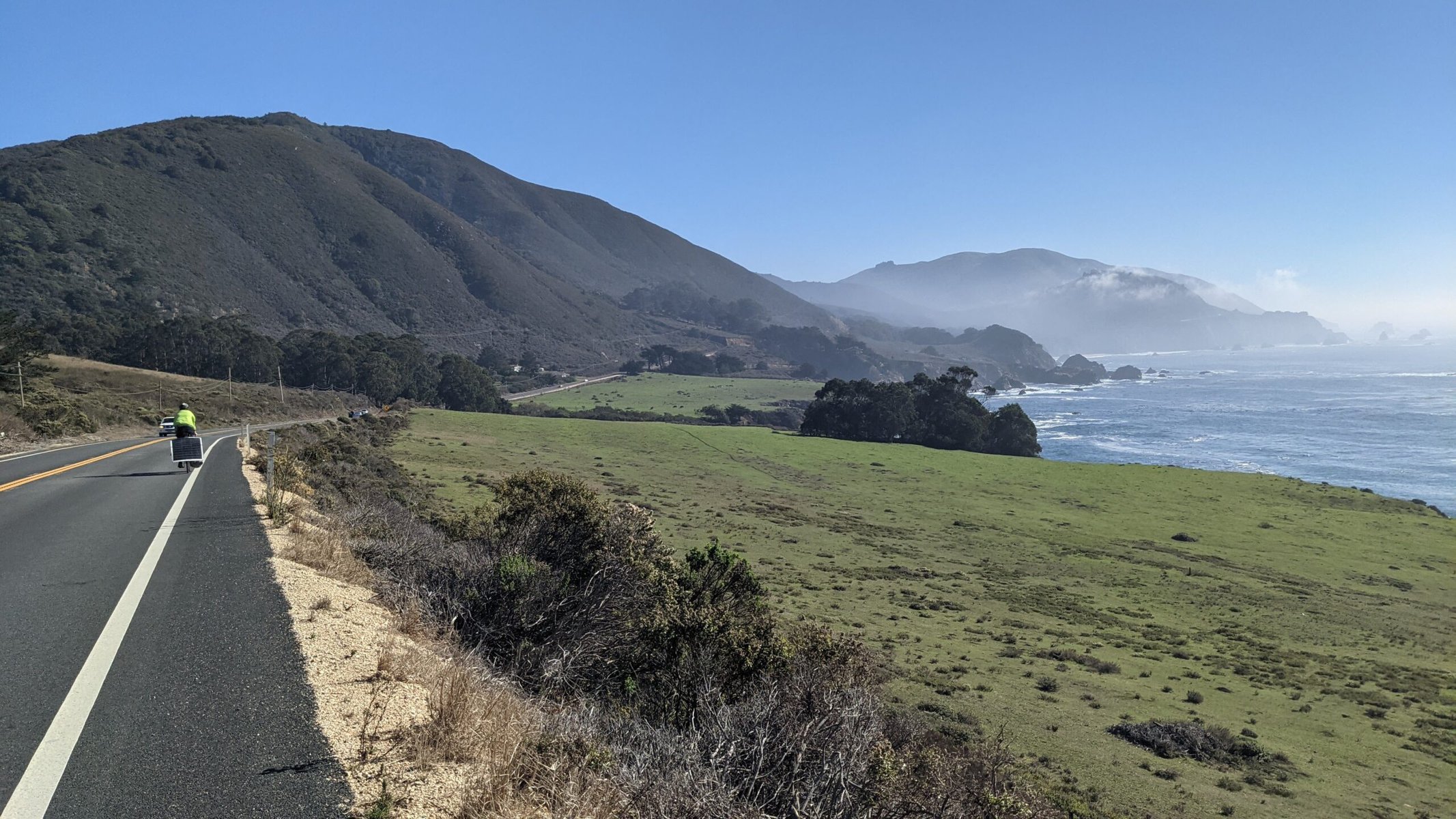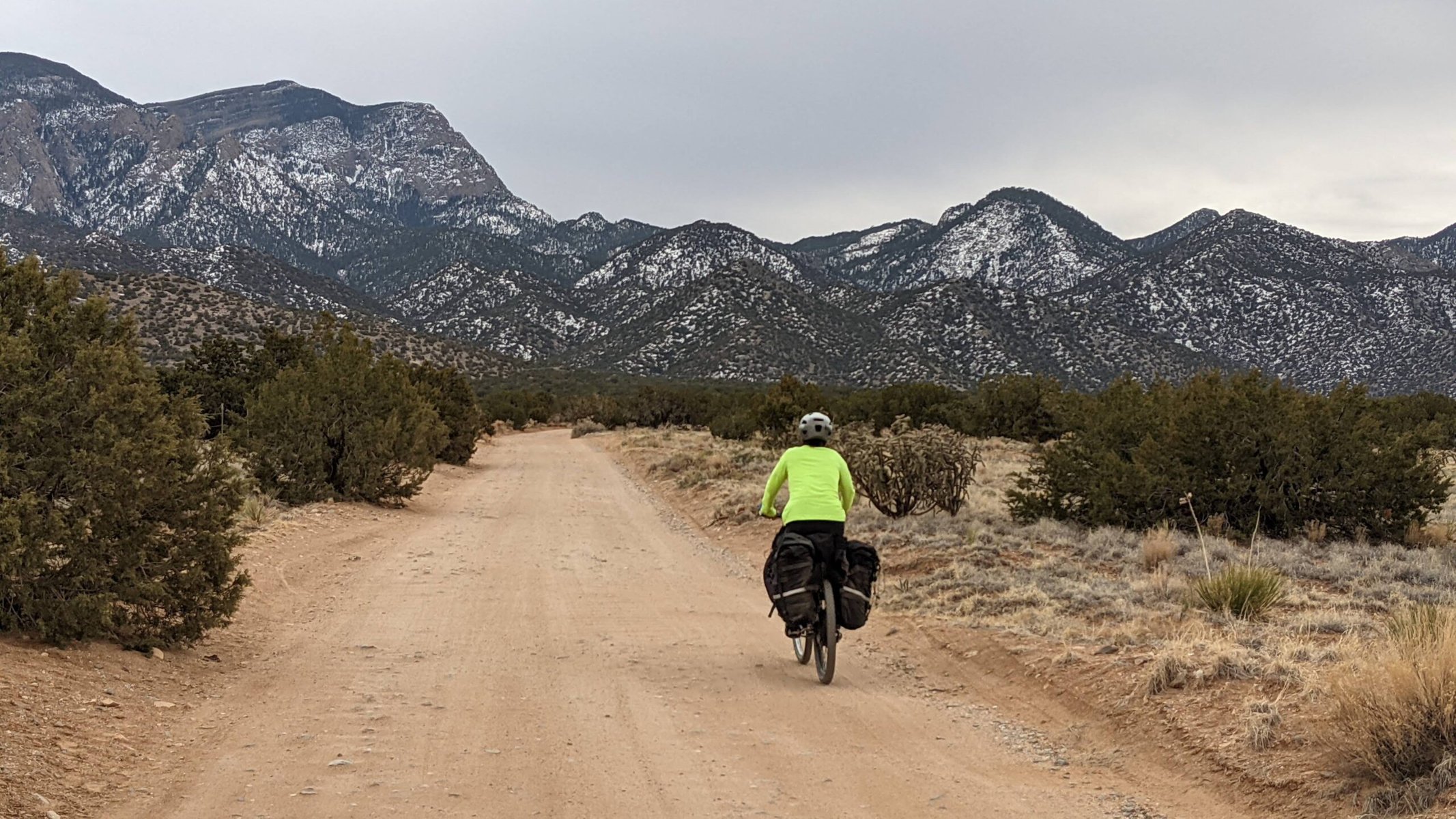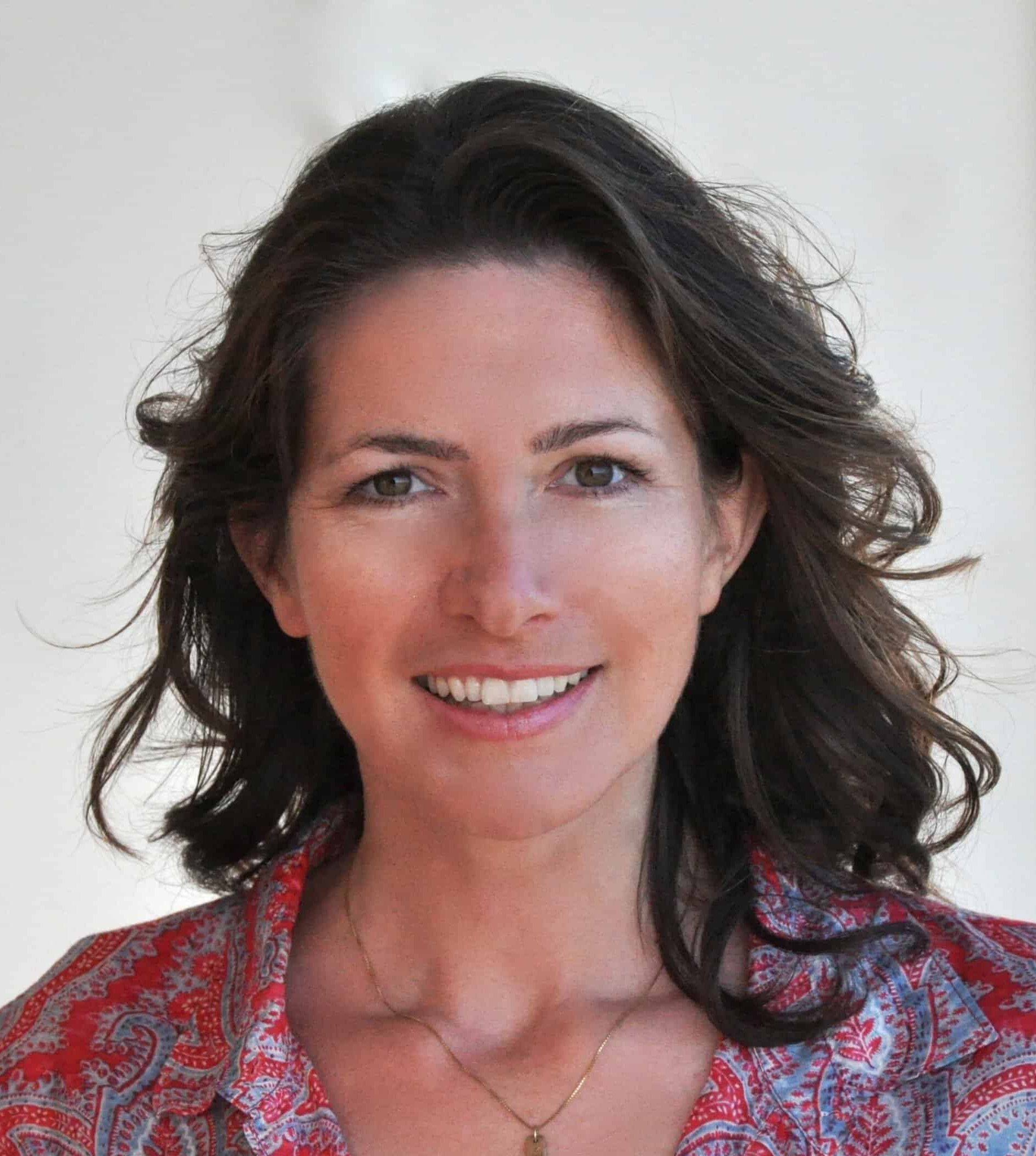Claire and Will Stedden’s honeymoon looked a little different than most people’s. When they got married in 2017, they planned a celebratory trip to New Zealand, but then Claire, a science writer, made an alarming discovery: “The CO2 emissions of one flight to New Zealand are almost 1.5 times more than the emissions that are considered sustainable for one person for an entire year,” she explains. “We couldn’t feel good about doing that, so we asked, what else can we do?”
After several years of research and preparations, the Steddens went on a year-long bicycle trip in 2021 from their then-home in Mendocino up the Oregon coast to the Columbia River Gorge, Mount Rainier and Olympic National Park in Washington before bicycling down to Southern California. There, they rolled their bikes onto a train to Tucson, Arizona, biked to New Mexico and explored the areas around Albuquerque and Santa Fe before taking another train to Madison, Wisconsin, where they now live.
Both Steddens, now 35 years old, call the trip “absolutely life-changing.” Will, a data scientist, reminisces, “I still remember bicycling into a redwood forest. When you’re in a car, you see everything through a window like on TV, but when you’re riding, you’re embedded in your environment; you become part of nature.”

Claire Stedden mainly raves about their encounters with people. “You experience humanity very differently, all this kindness of strangers, people wanting to help you and being excited about what you do.” Their eye-catching setup — a trailer covered by solar panels that power their e-bikes, which are loaded with camping gear — naturally elicits questions from locals and other bikers. They had built their own solar e-bikes simply by watching YouTube videos, but ended up breaking one bike on their 5,000 mile journey.
The couple became so enthusiastic about bike trips that in 2022, they started Solarpunk Travel, a free online community for bicycle enthusiasts who want to travel ecologically while also giving back to the community. “People always ask us how we do it, how we built the solar e-bikes, and what the best routes are,” Will Stedden explains. “So we started putting information online and inviting others to do the same.”
Solarpunk is now a worldwide artistic movement that not only envisions but actively works to realize a sustainable future. The word is a mix of “solar” to represent renewable energy sources and “punk” because, as Will puts it, “we’re not high-tech. We’re figuring things out as we go, and I built some of the bike parts from metal I actually found by the side of the road.” The Steddens define Solarpunk as “a movement to imagine a utopian future where we resolve social problems and implement technological solutions to bring about abundance for everyone.”
What the Steddens call “regenerative travel” includes not only traveling with bicycles or public transport for minimal environmental impact, but also supporting communities they visit along the way. For instance, they helped improve bike trails around Tucson, planted trees along the Rio Grande and ended up “wwoofing” a lot. WWOOF, which stands for Worldwide Opportunities on Organic Farms, is a nonprofit that links visitors with organic farms, including more than 1,400 across the US. “Connecting with others,” Claire emphasizes. “It’s not only a really fun way of doing things, but we meet a lot more people and have richer experiences than if we just booked a flight and a hotel.”

Like-minded initiatives include Crazy Guy on a Bike, started by Neil Gunton from Lebanon, Oregon, after his 1998 bicycle tour across the US, and Suntrip in Europe. Both platforms similarly encourage others to post their travelogues, tips and advice. Another network the Steddens relied on is Warm Showers, a couch-surfing platform for bicyclists with over 180,000 members in 160 countries.
The Steddens (a melding of Claire’s Stevenson and Will’s McFadden) are inspired by Peter Kalmus, a climate scientist at NASA, and by Take the Jump, a movement advocating for ecological lifestyle shifts, including a plant-based diet and less consumption. They still don’t own a car, and the experiences on their bicycle trips have changed their entire lifestyle. They were already eating mostly vegetarian when they started their first big tour, “but staying at farms, sometimes we had to separate the baby goats from their mothers or watch the chickens being killed,” Will remembers with a shudder. “So, yeah, we’re vegans now.”
Their belated honeymoon also doubled up as their move across the country. By the time they reached Madison, Wisconsin, “we essentially moved into the new apartment with our bikes,” says Claire. Most of their clothes and furniture are second-hand. Apart from some items they had put in storage, they picked up furniture at the annual “Hippie Christmas” at the beginning of August, when Madison students put everything on the street they haven’t been able to sell after moving out of their student homes. Will also changed his job and worked for a bicycle share program for a while.
On weekends and during holidays, the Steddens host free bicycle trips around Madison. They have had a couple of close calls with cars and aggressive dogs while bicycling but overall the benefits far outweigh the risks for them. “You experience the landscape differently; you traverse places you wouldn’t otherwise see,” Claire says. She also underlines the self-reliance they experience on the tours. “It’s empowering to travel by the power of just your own body and solar energy. You really can survive the heat and the rain and go further than you think.”

The Steddens don’t feel like they’re missing out — on the contrary. “When we go somewhere, we stay longer and take everything in,” Claire says. She also appreciates the flexibility, for example, “when locals tell you to check out this cool thing, because you don’t have to rush to your plane or hotel reservation. It makes traveling more of an adventure.” Because travel by bike is harder to plan, campgrounds in several states, including California, Oregon and Washington, have a no-turn-away policy for bicycle travelers who arrive at a full campground. “There are definitely more challenges and more unknowns along the way, but when you figure it out, it also feels more like an accomplishment than when you just book a plane,” Claire sums up her experience. “You feel like you’re a bit of an explorer.”
The Steddens are not firmly opposed to all flying, though Will declined a job offer from a company because the position would have required him to fly. “Flying is the largest single activity you can omit for the planet,” Will says. Having lived in California for several years at the beginning of their relationship, the wildfires and drought clearly drove the consequences of climate change home for him. “I don’t want to feel regretful that I was an excess contributor.”
Crushed by negative news?
Sign up for the Reasons to be Cheerful newsletter.Both have taken the Flight Free Pledge, vowing to “fly less and save more.” According to Take the Jump, one domestic flight every three years or one international flight every eight years could be considered sustainable. The Steddens are planning a trip to Europe in about five years, where they will, of course, travel by bike and train. “I definitely want to see Europe,” Claire says, “but instead of taking quick trips, we stay longer and really soak it up wherever we go.”
What does the couple say to people who feel individual changes have little impact and bigger systemic changes are needed?
They do hear that argument a lot.
“Where does the bigger change come from?” Claire asks. “People have to start demanding, or corporations won’t change. If everybody decides to fly less, eventually you’ll find fewer planes in the air. We have to start living the change for that to happen.”









